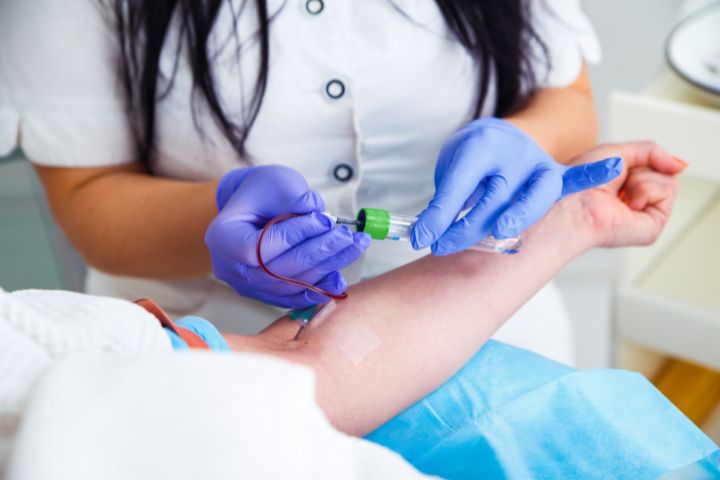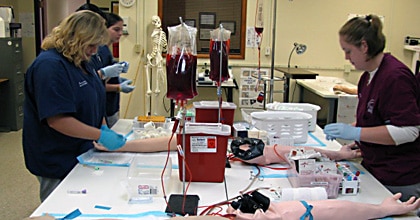Phlebotomy Classes Near Me: Flexible Options That Fit Your Schedule
Phlebotomy Classes Near Me: Flexible Options That Fit Your Schedule
Blog Article
The Course to Certification: Comprehending the Phlebotomy Educating Course Journey and Its Significance
As you take into consideration the course to qualification in phlebotomy, it is essential to comprehend the role you'll play in health care. Your training will cover vital skills, from blood collection techniques to patient interaction. Each part of the program prepares you for the obstacles in advance. What precisely does the journey entail, and why is certification so essential for your future profession? Let's explore these inquiries better.

The Duty of Phlebotomists in Health Care
Phlebotomists play an important duty in the health care system, acting as the vital link in between clients and essential analysis testing. You'll execute blood draws, making certain samples are accumulated accurately and securely. Your knowledge aids in identifying clinical conditions, checking health, and leading treatment choices.
In your everyday communications, you'll need to establish trust fund with clients, making them really feel comfortable throughout what could be a demanding experience. You're accountable for classifying and dealing with examples thoroughly to stop contamination or mistakes, which could influence test results.
Past this, you'll frequently work along with medical professionals and registered nurses, connecting critical information about patients' conditions. By grasping your skills, you contribute meaningfully to client care, making you an essential part of the medical group.
Overview of Phlebotomy Training Programs
When exploring phlebotomy training programs, you'll find numerous kinds created to fit various schedules and learning styles. Each program aids you create crucial abilities like blood collection and individual interaction. Understanding these options is vital to picking the ideal path for your career.
Sorts Of Educating Programs
Several kinds of training programs are available for those looking to end up being proficient in phlebotomy. Furthermore, some hospitals and centers use on-the-job training programs, providing functional experience while you find out. Whatever path you select, each program intends to outfit you with the required abilities for an effective phlebotomy career.

Trick Abilities Developed
Mastering phlebotomy requires a set of essential skills that are established with complete training programs. You'll find out technological abilities like correct vein option, needle insertion, and blood collection techniques. These hands-on practices guarantee you can perform procedures securely and successfully. In addition, interaction abilities are essential; you'll require to engage with individuals, describe procedures, and put them secure. Comprehending anatomy and physiology is crucial, too, as it helps you situate blood vessels and recognize the body's action to blood draws. You'll obtain expertise of security protocols and infection control, assuring you keep a sterilized environment. Each of these skills is crucial for your success as a qualified phlebotomist, making you a useful asset in any kind of medical care setting.
Key Elements of a Phlebotomy Program
In a phlebotomy course, you'll concentrate on necessary topics that prepared for your future career. You'll take part in hands-on training that allows you to apply what you've found out in real-world settings. Both the curriculum and functional experience are important for your success as a phlebotomist.
Core Curriculum Introduction
While seeking a phlebotomy training course, you'll come across a curriculum created to outfit you with fundamental skills and expertise. Phlebotomy school. This educational program usually consists of makeup and physiology, concentrating on the circulatory system and comprehending blood parts. You'll also find out about various kinds of blood collection approaches, consisting of venipuncture and capillary leak strategies
In addition, infection control and safety and security procedures are vital elements, ensuring you understand just how to keep a sterilized atmosphere. You'll study patient communication, stressing communication and empathy, which are critical for reducing individual stress and anxiety.
Hands-On Training Experience
Getting hands-on experience is an important part of your phlebotomy training program. This functional training allows you to use what you have actually learned in a real-world setup, improving your skills and self-confidence. You'll practice venipuncture strategies, discover how to description take care of various types of samplings, and get knowledgeable about the devices made use of in the field. Under the advice of seasoned teachers, you'll improve your skills, guaranteeing you're gotten ready for any kind of circumstance you could deal with.
Additionally, you'll get the opportunity to connect with people, which is necessary for establishing your communication abilities. This mix of technological efficiency and social skills is crucial for your success as a certified phlebotomist. Ultimately, hands-on training is where concept satisfies technique, strengthening your knowledge and preparedness for certification.
Qualification and Licensing Requirements
Before you can start your profession in phlebotomy, it is crucial to comprehend the qualification and licensing needs that differ by state. Many states call for phlebotomists to hold a certification from a recognized company, such as the National Phlebotomy Organization or the American Culture for Professional Pathology. These qualifications generally include passing an examination that checks your expertise and abilities in the area.
Along with certification, some states have specific licensing demands. You may need to finish a certain number of hours in clinical technique, submit proof of training, or go through a history check. It is very important to investigate click here to find out more your state's policies to see to it you satisfy all necessary standards.
Staying informed regarding these demands not only helps you safeguard a position but additionally improves your trustworthiness as a specialist. By fulfilling these demands, you'll be well on your means to a successful job in phlebotomy.
Hands-On Training and Practical Experience
Hands-on training and useful experience are necessary components of your phlebotomy education, as they enable you to use theoretical knowledge in real-world circumstances. During your training, you'll engage in supervised venipuncture, learn correct methods, and come to be accustomed to various blood collection devices. This straight participation is critical for developing your self-confidence and refining your skills.
You'll work very closely with knowledgeable experts who can guide you through the nuances of person interaction and example handling. Each session not only strengthens your understanding yet likewise prepares you for the fast-paced setting of health care setups.
Additionally, several programs integrate scientific rotations, permitting you to experience diverse setups, from healthcare facilities to outpatient clinics. This exposure helps you adjust to various challenges and individual needs, guaranteeing you're well-prepared for your future duty. Welcome these chances, as they're important to ending up being a competent and compassionate phlebotomist.
Obstacles Faced During Training
While obtaining hands-on experience is vital, it is necessary to identify the obstacles that can emerge throughout your phlebotomy training. You could encounter anxiousness when performing treatments on genuine people, especially if you're brand-new to the atmosphere. The stress to get every little thing right can be overwhelming. In addition, understanding the skills required for blood draws takes technique; you might have a hard time with technique initially.
Time management can likewise be a hurdle, as balancing concept, useful sessions, and personal dedications can really feel challenging. You may face varying finding out paces amongst your peers, resulting in feelings of insecurity if you assume you're falling back. Lastly, adjusting to the different individualities of instructors can be tough, as each might have a distinct teaching design.
Recognizing these barriers early can prepare you for success and aid you establish resilience throughout your training journey.
Profession Opportunities After Certification

As you gain experience, you could also consider concentrating on locations like pediatric or geriatric phlebotomy, accommodating certain client needs. Some phlebotomists internet pick to advance their occupations by ending up being laboratory specialists or going after more education and learning in healthcare fields.
Additionally, your certification can cause roles in training or overseeing brand-new phlebotomists, permitting you to share your knowledge. With the health care industry continuously expanding, your abilities will always remain in demand, leading the way for a secure and meeting job. Embrace the opportunities waiting for you!
Frequently Asked Concerns
What Is the Regular Duration of a Phlebotomy Educating Course?
Phlebotomy training courses normally last around four to eight weeks. You'll engage in hands-on technique, classroom instruction, and on-line understanding. Finishing this training prepares you for qualification and a rewarding occupation in healthcare.
Are Online Phlebotomy Courses Available?
Yes, online phlebotomy programs are readily available. They use versatility and comfort, enabling you to research at your very own pace. Just validate the program is certified to satisfy qualification needs and obtain valuable skills for your occupation.
Just How Much Does Phlebotomy Training Commonly Cost?
Phlebotomy training usually sets you back in between $700 and $2,500, relying on the program and location. You ought to think about elements like program size, consisted of materials, and hands-on experience when selecting the best training for you.
What Prevail Requirements for Phlebotomy Training?
Typical requirements for phlebotomy training usually include a secondary school diploma or GED, immunizations, and a history check. Some programs might also need basic healthcare understanding or certifications, ensuring you're prepared for hands-on training.
Can I Work While Completing My Phlebotomy Training?
Yes, you can work while completing your phlebotomy training. Numerous students equilibrium tasks with their studies, yet make certain to manage your time successfully to ensure you meet both work and training commitments efficiently.
Report this page